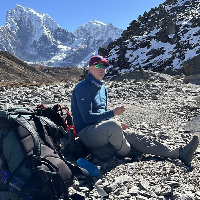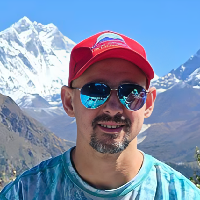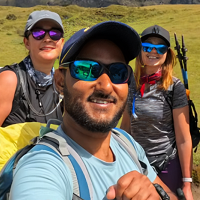1. What is the best season for Island Peak climbing?
The best for Island Peak climbing is considered to be the peak seasons like spring (March to June) and autumn (September to November). Both the spring and autumn seasons have stable weather and warm temperature; these seasons offer unobstructed views of the Himalayas and surrounding, making it the best time for the expedition.
2. Do I need prior climbing experience for Island Peak climbing?
Although previous climbing experiences do certainly help with the expedition, you don’t need any prior experience for Island Peak climbing. In fact, this beautiful peak in the Himalayas is considered to be a practice where mountaineering beginners come to test their skills and gain experience.
3. How challenging is Island Peak climbing?
Island Peak climbing is a technical climb where you will have to use mountaineering equipment; you will also need a good amount of stamina and endurance level on this expedition that exceeds the 6,000 meters altitude. You will be also given pre-ice climbing training at the base camp, where you will be taught to skillfully use mountaineering tools like ropes, harness gears, ice peaks, and crampons.
4. What are the physical standards for this expedition?
As this mountain expedition takes place at a significant altitude, you will need a good level of physical fitness to complete the adventure successfully. It is recommended that you start your preparation at least 4- 6 months before the actual expedition.
5. What kind of accommodation is available for Island Peak climbing?
You will accommodate in the teahouses during the trekking trails of the Island Peak climbing expedition and in tented accommodation at Peak Climbing Base Camp. Our team will take care of your essentials, from food to lodging, so you will have a comfortable experience even when camping.
6. Do you provide an oxygen supply if needed?
Yes, you can get the oxygen supply for the higher altitudes if needed; the teahouses in the Lobuche and Gorakshep regions offer oxygen bottles at an extra cost if needed. We also provide an oxygen supply that you can pre-book and can be carried with you for use in higher altitudes.
7. How high is Nepal’s Island Peak?
The Island Peak is at an altitude of 6189 meters (20,305 feet); situated between Ama Dablam and Mt. Lhotse, this peak is an extension of the Lhotse Shar to the south end.
8. Who named Island Peak?
Eric Shipton’s expedition team named this alluring peak in the Himalayas as ‘Island Peak’ in 1952. As this mountain resembles the shape of an island in the sea of ice when viewed from Dingboche, it was named the Island Peak, which was later renamed to ‘Imja Tse’ in 1983.
9. How much does Island Peak climbing cost?
In general, the cost of Island Peak climbing ranges from US$ 2200 to US$ 2700 depending on the set of itineraries. We here at Marvel Adventure offer this exhilarating experience at just US$ 2,195, the best value package in Nepal without compromising in any aspect.
10. How long does it take to complete the expedition?
Island Peak climbing takes 16 days to complete; this includes following the route of mainstream Everest trekking after entering Lukla and returning to Lukla after a successful summit of the mountain.
11. Is Island Peak climbing technical?
Yes, the Island Peak expedition is considered a technical climb. Although you don’t need any previous mountaineering experience to ascend this mount, you will be using different mountaineering equipment while scaling to the summit of this mountain.
12. Can you see Mt. Everest from Island Peak?
Yes, as the Island peak is situated close to Mt. Everest, you can enjoy the spectacular views of the tallest mountain in the world as well as other adjacent peaks in the Himalayas like Ama Dablam, Lhotse, Pumori, Nuptse, Pumori, and Makalu.
13. Can you climb Island Peak without a guide?
No, according to the new policy of the Nepal Government, solo climbers and trekkers from foreign countries will not be allowed for the solo expedition. The climbers and trekkers will need to hire government-licensed guides or join guided expedition groups.
14. Which is harder, Mera Peak or Island Peak?
Mera Peak, the highest trekking peak in the country, is graded ‘Alpine Grade PD,’ which means it is a slightly difficult climb with some technical segments. However, considering the ‘2B Alpine Grading’ of Island Peak, it is more difficult to scale than the Mera Peak.
15. Is Island Peak climbing worth it?
If you are looking for an expedition that isn’t too strenuous or too easy, which you can use to check out your skill levels, then Island Peak climbing is an ideal peak for you. Island Peak, in the 6,000 meters class, is a significant mountain that provides exhilarating adventure for both beginners and season mountaineering enthusiasts.













